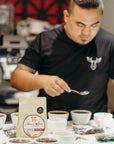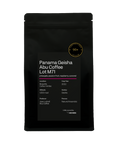The legendary Panama Geisha variety is acclaimed for its sweet florality and bright overtones. Since its debut win at the Best of Panama auction in 2004, it has kept specialty coffee lovers everywhere captivated by its delicacy, complexity, and clarity of flavors. As such, it is often showcased on coffee competition stages by a great number of coffee champions, and it also continues to fetch the highest prices.
The esteemed status of the Panama Geisha is also due to its scarcity, owing to the variety’s unique genetics (responsible for its exceptional cup quality) that allows it to capture the best features of the Boquete terroir, and that are not shared by Geisha grown in other origins. The plants also require longer time to grow and more diligent care due to their delicate root systems. And, since Geisha trees have wide branch spans, they need to be spaced farther apart in the farm, resulting in less cherries per hectare at harvest.
At the Abu Coffee farm in Canas Verdes, ripening takes nine to ten months, and two to three months to complete the harvesting process — all by hand-collection. Further, because the trees are very tall, hand-collecting the perfectly ripe cherries requires even the most seasoned pickers to exert more effort.
For Lot M-71, the cherries were selectively collected by hand at the peak of maturation, and then sorted and floated in mountain spring water. After this, fermentation was done in two phases. The whole cherries were first fermented in open tanks for 24 hours, and then they were taken into an anaerobic dry process, under the shade, in sealed plastic tanks with thick walls for 72 hours. Sun-drying on raised beds followed and took 25 days to complete.












